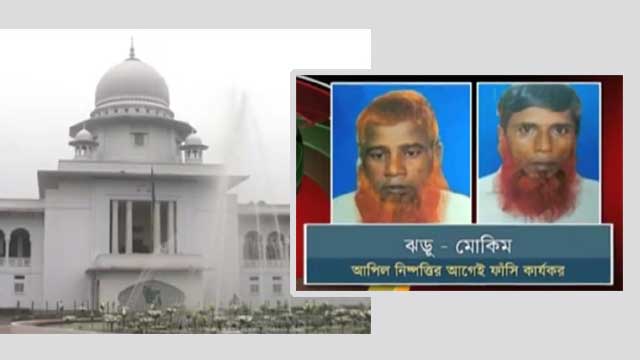The Appellate Division on Wednesday dismissed separate pending appeals of two Chuadanga residents Jharu and Mokim on the ground that the appeals became redundant as they were hanged for murder.
The Jashore Central Jail authority on November 16, 2017, hanged Jharu and Mokim after their jail appeals and mercy petitions were rejected.
The jail authority hanged the duo before their criminal appeals were heard and disposed of by the Appellate Division. The issue came to the light recently when the criminal appeals of Jharu and Mokim came to the list for hearing.
Rejecting the appeals, a five-judge online bench, chaired by chief justice Syed Mahmud Hossain, said that the court in its full order would set out guidelines on the matter.
The chief justice pointed out to a 2013 criminal appeal of one Sujan, which was also on the cause-list on Wednesday.
The Appellate Division earlier acquitted Sujan of a murder charge after hearing his jail appeal.
Referring to Sujan’s case, attorney general AM Amin Uddin asked the court if an individual could be sentenced after hearing his criminal appeal when he was acquitted following his jail appeal.
The court also declared Sujan’s criminal appeal ‘infructuous’ as he was earlier acquitted by the court.
Mokim and Jharu had two separate appeals - ‘jail appeal’ filed by the jail authority on their behalf on August 24, 2013 and ‘criminal appeal’ filed by their lawyers later - challenging a High Court judgement delivered on July 8, 2013, that upheld their death sentences.
The jail appeal was filed as Jharu and Mokim could not afford to engage a lawyer to defend them.
They were handed the death sentences by the trial court in 2008 for killing UP member Monowar Hossain on June 28, 1994.
Their lawyers came to know recently that they were hanged before their appeals were heard and disposed of by the Appellate Division.
The lawyers – Ashif Hasan and Md Humayun Kabir – got the information about the executions of Jharu and Mokim from their families on October 27 when Humayun contacted the family members after their criminal appeals appeared in the cause-list of the Appellate Division for hearing.
As their lawyers disclosed the unprecedented incident of hanging to the media on November 3, law minister Anisul Huq, home minister Asaduzzaman Khan and attorney general AM Amin Uddin came to the defence of the jail authority saying that there were no wrong executions.
They referred to the dismissal of Jharu and Mokim’s jail appeals and the president’s rejection of their mercy petitions.
The Appellate Division and the lawyers concerned on November 8 took up the appeals of Jharu and Mokim and refused to take responsibility as to why the two appeals of two death row convicts were not heard together by the court following the custom.
Asked to clarify, Jharu and Mokim’s another lawyer Sufia Khatun told the court that it was the duty of the officials of Appellate Division’s judicial section to merge both the jail appeal and criminal appeal for hearing together.
The chief justice told Sufia that there was no system in the Appellate Division that would merge two appeals digitally.
The chief justice said that the court usually merges jail appeal and criminal appeal of a convict only after the lawyer prayed to do so.
An additional district and sessions judge’s court of Chuadanga on April 17, 2008, sentenced three people—Abul Kalam Azad, Mokim and Jharu to death, and Helaluddin and Amirul – to life term for killing Monowar Hossain on June 24, 1994.
Azad, the then local union parishad chairman, and also Purba Bangla Communist Party leader, was the mastermind of the killing and led the murder of his village rival Monowar while his followers Mokim and Jharu hacked the victim to death, according to the lower court’s verdict.
The High Court later on July 8, 2013, upheld death sentences for Mokim and Jharu while Azad and Amirul were acquitted of the charges.
The court delivered the verdict after hearing a death reference and separate appeals filed by the five convicts.





